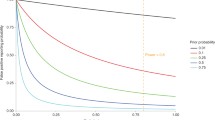Abstract
The documented low levels of reliability of the peer review process present a serious challenge to editors who must often base their publication decisions on conflicting referee recommendations. The purpose of this article is to discuss this process and examine ways to produce a more reliable and useful peer review system.
Similar content being viewed by others
References
Armstrong, J.S. & Hubbard, R. (1991) Does the need for agreement among reviewers inhibit the publication of controversial findings? Behavioral & Brain Sciences 14:136–137.
Bailar, J.C. (1991) Reliability, fairness, objectivity and other inappropriate goals in peer review. Behavioral & Brain Sciences 14:137–138.
Cicchetti, D.V. (1976) Assessing inter-rater reliability for rating scales: Resolving some basic issues. British Journal of Psychiatry 129: 452–456.
Cicchetti, D.V. (1982) On peer review: “We have met the enemy and he is us.” Behavioral & Brain Sciences 5:205.
Cicchetti, D.V. (1991a) The reliability of peer review for manuscript and grant submissions: A cross-disciplinary investigation. Behavioral and Brain Sciences 14:119–135.
Cicchetti, D.V. (1991b) Author’s response: Reflections from the peer review mirror. Behavioral & Brain Sciences 14:167–186.
Cicchetti, D.V. (1997) Peer review: Agreement and disagreement. Behavioral and Brain Sciences. In press.
Cicchetti, D.V., & Conn, H.O. (1976) A statistical analysis of reviewer agreement and bias in evaluating medical abstracts. Yale Journal of Biology & Medicine 49:373–383.
Cicchetti, D.V. & Eron, L.D. (1979) The reliability of manuscript reviewing for the Journal of Abnormal Psychology. Proceedings of the American Statistical Association (Social Statistics Section) 22:596–600.
Cicchetti, D.V. & Fleiss, J.L. (1977) Comparison of the null distributions of weighted kappa and the C ordinal statistic. Applied Psychological Methods 1: 195–201.
Cicchetti, D.V. & Sparrow, S.S. (1981) Developing criteria for establishing inter-rater reliability of specific items: Applications to assessment of adaptive behavior. American Journal of Mental Deficiency 86: 127–137.
Cicchetti, D.V., Volkmar, F., Klin, A. & Showalter, D. (1995) Diagnosing autism using ICD-10 criteria: A comparison of neural networks and standard multivariate procedures. Child Neuropsychology, 1: 26–37.
Cohen, J. (1960) A coefficient of agreement for nominal scales. Educational & Psychological Measurement 20: 37–46.
Cooper, G.S. & Zangwill, L. (1989) An analysis of the quality of research reports in the Journal of General Internal Medicine. Journal of General Internal Medicine 4:232–236.
Daniel, H. D. (1993) Guardians of Science: Fairness and reliability of peer review. VHC, New York.
Fleiss, J. L. (1975) Measuring agreement between two judges on the presence or absence of a trait. Biometrics 31: 651–659.
Fleiss, J. L. (1981) Statistical methods for rates and proportions, Wiley(2nd ed.), New York.
Fleiss, J. L. & Cohen, J. (1973) The equivalence of weighted kappa and the intraclass correlation coefficient as measures of reliability. Educational & Psychological Measurement 33: 613–619.
Fleiss, J. L., Cohen, J. & Everitt, B. S. (1969) Large sample standard errors of kappa and weighted kappa. Psychological Bulletin 72: 323–327.
Grove, W. M., Andreason, N. C., McDonald-Scott, P., Keller, M. B. & Shapiro, R. W. (1981) Reliability studies of psychiatric diagnoses: Theory and practice. Archives of General Psychiatry 38:408–413.
Hargens, L. L. (1988) Scholarly consensus and journal rejection rates. American Sociological Review 53: 139–151.
Hargens, L. L. (1990) Variation in journal peer review systems: possible causes and consequences. Journal of the American Medical Association 263:1348–1352.
Ingelfinger, F. J. (1974). Peer review in biomedical publication. American Journal of Medicine 56:686–692.
Kemper, K. J., McCarthy, P. L. & Cicchetti, D. V. (1996) Improving participation and interrater agreement in scoring APA abstracts: how well have we succeeded? Archives of Pediatrics and Adolescent Medicine 150: 380–383.
Kiesler, C. A. (1991) Confusion between reviewer reliability and wise editorial and funding decisions. Behavioral & Brain Sciences 14:151–152.
Lock, S. (1985) A difficult balance: Editorial peer review in medicine. ISI Press.
McGraw, K. O. & Wong, S. P. (1996) Forming inferences about some intraclass correlation coefficients. Psychological Methods 1: 30–46.
Oxman, A. D., Guyatt, G. H., Singer, J., Goldsmith, C. H., Hutchison, B. G., Milner, R. A. & Streiner, D. L. (1991) Agreement among reviewers of review articles. Journal of Clinical Epidemiology 44: 91–98.
Relman, A. S. (1978) Are journals really quality filters? Rockefeller working papers (conference, May 22–23, 1977, New York, NY). Coping with the biomedical literature explosion: A qualitative approach.
Rourke, B. P. (1991) Toward openness and fairness in the review process. Behavioral & Brain Sciences 14: 161.
Shrout, P. E. & Fleiss, J. L. (1979) Intraclass correlations: Uses in assessing rater reliability. Psychological Bulletin 86: 420–428.
Solomon, M. J. & McLeod, R. S. (1993) Clinical studies in surgical journals—have we improved? Diseases of the Colon and Rectum 36: 43–48.
Strayhorne, Jr. J., McDermott, Jr., J. F. & Tanguay, P. (1993) An Intervention to improve the reliability of manuscript reviews for the Journal of the American Academy of Child & Adolescent Psychiatry. American Journal of Psychiatry 150: 947–952.
Yalow, R. S. (1978). Radioimmunoassay: A probe for the fine structure of biology systems. In: Les prix nobel en 1977, Nobel Foundation, Almqvist & Wiksell, Stockholm, pp. 243–264.
Author information
Authors and Affiliations
Additional information
The author is a Senior Research Scientist & Biostatistician, Child Study Center and Department of Psychiatry in the Yale University School of Medicine.
Note: The main points of this report were presented at the Annual Meeting of the American Association for the Advancement of Science (AAAS) in Baltimore, Maryland, on February 9, 1996.
Rights and permissions
About this article
Cite this article
Cicchetti, D.V. Referees, editors, and publication practices: Improving the reliability and usefulness of the peer review system. SCI ENG ETHICS 3, 51–62 (1997). https://doi.org/10.1007/s11948-997-0016-4
Received:
Revised:
Accepted:
Issue Date:
DOI: https://doi.org/10.1007/s11948-997-0016-4




